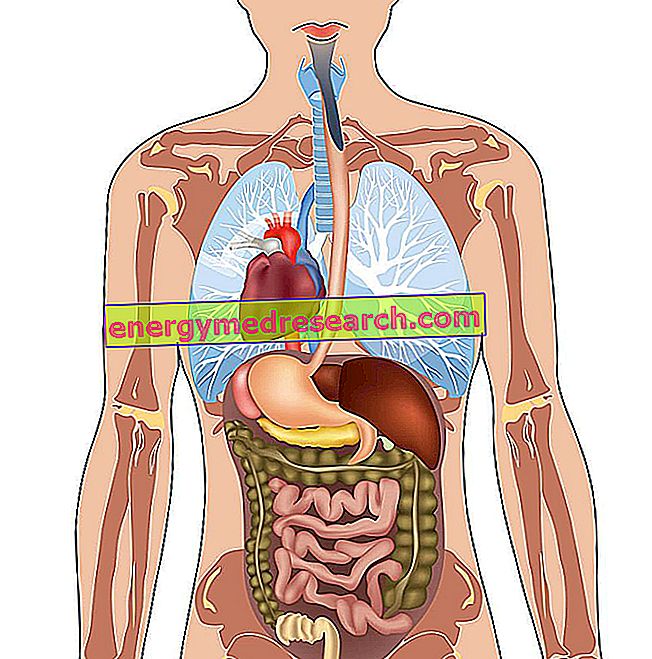Definition
Endemic mumps, synonymous with mumps, is an infectious viral and contagious disease involving two salivary glands (parotids) located just below the ears. Mumps is an infection typical of childhood and adolescence.
Causes
The etiological agent most involved in the onset of mumps is paramyxovirus (genus Rubulavirus ), a spherical virus found in breast milk, saliva, blood and urine of the affected subject. The virus infects the organism exclusively through the respiratory mucosa.
Symptoms
If the incubation of the mumps virus is asymptomatic (2-3 weeks), the acute phase instead involves a heterogeneous symptomatology: alteration of the hearing ability, asthenia, difficulty swallowing and eating, auricular and facial pain, fever, swelling of the lymph nodes and headache.
Complications (very rare): orchitis, meningoencephalitis, infertility.
Information on mumps - Drugs for the treatment of mumps do not intend to replace the direct relationship between health professional and patient. Always consult your doctor and / or specialist before taking Mumps - Mumps Treatment.
drugs
It is recommended to subject the child - target of mumps - to vaccination as a prophylaxis of the disease; in general, a combined vaccine is given for measles, mumps and rubella (eg ProQuad, MM-RVAXPRO).
What changes since 2017
With the decree law on the prevention of vaccination for minors from zero to 16 years, approved on 07/28/2017 , vaccination against mumps has become mandatory .
This specific vaccination can be performed with a single injection together with 3 other vaccination covers (the so-called quadrivalent MPRV vaccination, which includes vaccines: anti-measles, anti-rubella, anti-mumps, anti-varicella).
- The obligation of vaccination against mumps is in force, in the context of the 10 mandatory vaccinations, for those born from 2017. Even those born after 2001 are subject to the obligation of vaccination against mumps .
- Immunized subjects due to natural disease are exempted from the vaccination requirement, so children who have already contracted mumps will not have to be vaccinated against this disease
Please note that compulsory vaccinations are a requirement for admission to nursery schools and kindergartens (for children from 0 to 6 years) and that the violation of the vaccination requirement implies the application of significant financial penalties .
For more information on mandatory vaccines in children, see this article.
However, it is good to remember that 10% of vaccinated subjects still show mumps: generally, after the first infection, the patient remains almost immune for life (except for some rare cases).
For the treatment of mumps there is no targeted and precise drug treatment: in most cases, non-steroidal anti-inflammatory drugs (NSAIDs) are used. Cortisonics are useful for patients with mumps with degeneration in orchitis or meningitis.
- Paracetamol or acetaminophen (eg tachypirina): the administration of this drug is useful for lowering fever, a typical symptom that generally accompanies mumps. Paracetamol is administered at a dosage of 325-650 mg per day every 4-6 hours; alternatively, take 1 gram every 6-8 hours. The drug can also be administered intravenously: 1 gram every 6 hours or 650 mg every 4 hours for adults and adolescents weighing more than 50 kilos: if the patient weighs less than 50 kilos, give 15 mg / kg every 6 hours or 12.5 mg / kg every 4 hours.
Do not administer acetylsalicylic acid (eg ASPIRIN, Ascriptin, Aspro) to children under the age of 12 suffering from viral diseases to avoid the risk of Reye's syndrome.
- Cortisone (eg Cortis Acet, Cortone): this drug belongs to the category of corticosteroids and is recommended in cases of mumps associated with orchitis. Cortisone is available in 25 mg tablets: the dosage and the timing of intake should be indicated by the doctor, and vary from subject to subject depending on the severity of the complication.
- Also Hydrocortisone (eg Locoidon, Colifoam) is administered as a powerful anti-inflammatory in case of mumps complications; it should be taken at a dosage of 15-240 mg / day, based on the severity of the complications.
In case of mumps, it is recommended to take many fluids and food, even in the absence of appetite. Furthermore, in the context of mumps, it is recommended to apply ice packs (cryotherapy) or hot bags directly to the patient's neck, to speed healing.



